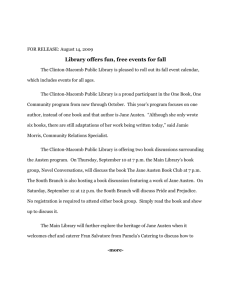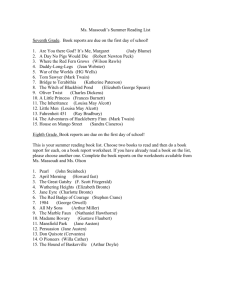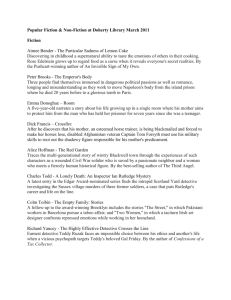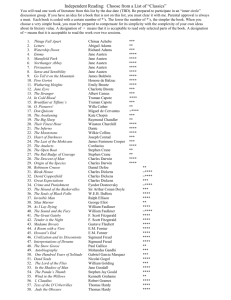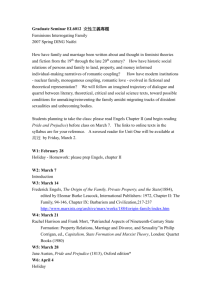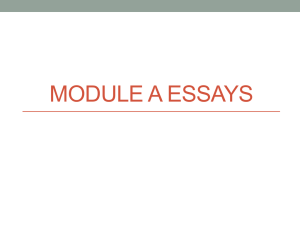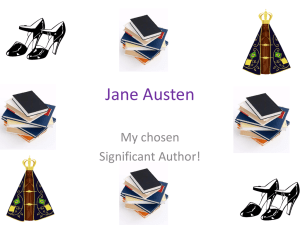Jane Austen, Then and Now
advertisement
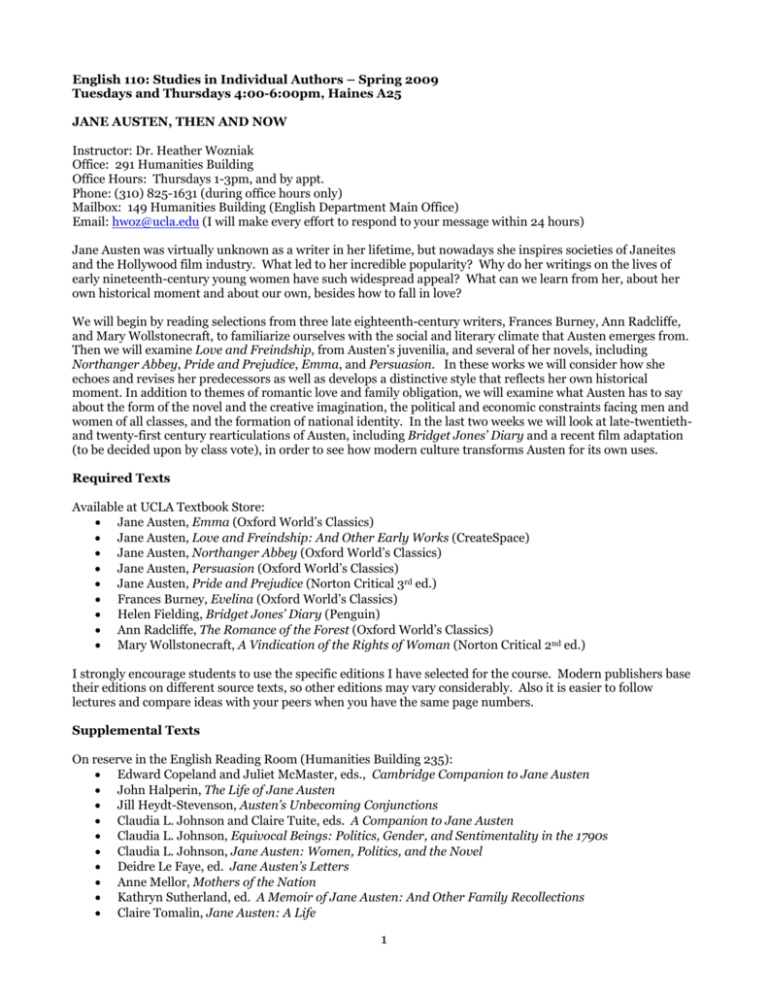
English 110: Studies in Individual Authors – Spring 2009 Tuesdays and Thursdays 4:00-6:00pm, Haines A25 JANE AUSTEN, THEN AND NOW Instructor: Dr. Heather Wozniak Office: 291 Humanities Building Office Hours: Thursdays 1-3pm, and by appt. Phone: (310) 825-1631 (during office hours only) Mailbox: 149 Humanities Building (English Department Main Office) Email: hwoz@ucla.edu (I will make every effort to respond to your message within 24 hours) Jane Austen was virtually unknown as a writer in her lifetime, but nowadays she inspires societies of Janeites and the Hollywood film industry. What led to her incredible popularity? Why do her writings on the lives of early nineteenth-century young women have such widespread appeal? What can we learn from her, about her own historical moment and about our own, besides how to fall in love? We will begin by reading selections from three late eighteenth-century writers, Frances Burney, Ann Radcliffe, and Mary Wollstonecraft, to familiarize ourselves with the social and literary climate that Austen emerges from. Then we will examine Love and Freindship, from Austen’s juvenilia, and several of her novels, including Northanger Abbey, Pride and Prejudice, Emma, and Persuasion. In these works we will consider how she echoes and revises her predecessors as well as develops a distinctive style that reflects her own historical moment. In addition to themes of romantic love and family obligation, we will examine what Austen has to say about the form of the novel and the creative imagination, the political and economic constraints facing men and women of all classes, and the formation of national identity. In the last two weeks we will look at late-twentiethand twenty-first century rearticulations of Austen, including Bridget Jones’ Diary and a recent film adaptation (to be decided upon by class vote), in order to see how modern culture transforms Austen for its own uses. Required Texts Available at UCLA Textbook Store: • Jane Austen, Emma (Oxford World’s Classics) • Jane Austen, Love and Freindship: And Other Early Works (CreateSpace) • Jane Austen, Northanger Abbey (Oxford World’s Classics) • Jane Austen, Persuasion (Oxford World’s Classics) • Jane Austen, Pride and Prejudice (Norton Critical 3rd ed.) • Frances Burney, Evelina (Oxford World’s Classics) • Helen Fielding, Bridget Jones’ Diary (Penguin) • Ann Radcliffe, The Romance of the Forest (Oxford World’s Classics) • Mary Wollstonecraft, A Vindication of the Rights of Woman (Norton Critical 2nd ed.) I strongly encourage students to use the specific editions I have selected for the course. Modern publishers base their editions on different source texts, so other editions may vary considerably. Also it is easier to follow lectures and compare ideas with your peers when you have the same page numbers. Supplemental Texts On reserve in the English Reading Room (Humanities Building 235): • Edward Copeland and Juliet McMaster, eds., Cambridge Companion to Jane Austen • John Halperin, The Life of Jane Austen • Jill Heydt-Stevenson, Austen’s Unbecoming Conjunctions • Claudia L. Johnson and Claire Tuite, eds. A Companion to Jane Austen • Claudia L. Johnson, Equivocal Beings: Politics, Gender, and Sentimentality in the 1790s • Claudia L. Johnson, Jane Austen: Women, Politics, and the Novel • Deidre Le Faye, ed. Jane Austen’s Letters • Anne Mellor, Mothers of the Nation • Kathryn Sutherland, ed. A Memoir of Jane Austen: And Other Family Recollections • Claire Tomalin, Jane Austen: A Life 1 Course Requirements and Grading Grades will be posted in the MyUCLA Gradebook, so you can track your progress. The Student View does not reflect the weights assigned to each category—please remember to adjust for these weights when calculating your course average. 1. Participation – Attentive listening and active participation in discussions are required. Since this is a large lecture course it may not always be possible to speak up in class. You may also demonstrate your engagement with the material and with your peers on the course website Discussion Board. Please be respectful of your classmates and their ideas at all times. Excessive absences or tardiness will limit your exposure to course material and the critical thinking that occurs in the classroom, and your participation grade will be lowered accordingly. (10%) 2. Quizzes – There will be five unannounced in-class quizzes in the format of term id’s or passage explications. These quizzes will allow you to practice the close reading and analytical skills needed for your paper and final exam. No make-ups for missed quizzes, but the lowest quiz score will be dropped. (10%) 3. Paper – One paper of 6-8 pages. This paper will be an argumentative essay that uses close reading and textual analysis to support its claims. Essay prompts will be distributed in class. A first draft of this paper will be due for Peer Review in Week 9. If you do not submit a first draft on this date, you will lose the constructive comments of your peers and the final paper grade will be lowered by one full grade. The final draft of the paper will be submitted electronically to Turnitin (see further discussion below) and the first draft and peer review comments to my mailbox in Humanities 149. No late papers will be accepted. (30%) 4. Peer Reviews – You will be required to complete two take-home Peer Reviews assessing your classmates’ papers and giving them constructive comments for revision. Guidelines will be distributed in class. Late Peer Reviews will not receive any credit, but they should still be submitted for the sake of your classmates who are relying on your feedback. (10%) 5. Final Exam – Three sections will test your familiarity with the authors, texts, and themes covered in the course. Part 1 will ask you to define key terms, characters, and phrases. Part 2 will ask you to identify and explicate passages from the readings. And Part 3 will ask you to write two essays, a short one related to the film we will watch and a longer one discussing how two works address a given issue or problem. (40%) Academic Integrity Plagiarism is unacceptable and will not be tolerated under any circumstances. If you borrow an idea, whether from a book, magazine, the Internet, another student, or your own previous work, you must acknowledge the source with a citation (even if you don’t use the source’s exact words). Plagiarism is a serious offense that could result in your dismissal from UCLA. University Policy requires me to report all instances of suspected plagiarism to the Dean of Students for disciplinary action, and I will not hesitate to do so. In order to encourage appropriate citation habits, you will be required to submit electronic copies of your papers to Turnitin.com. Turnitin compares the contents of your paper to the Internet, several article databases, and all other student papers submitted to Turnitin. By using this tool, I hope to take away the temptation to cheat (which can be very real for some students, especially if they are having a personal crisis or lack confidence in their writing abilities) and encourage you to document your sources correctly. Since I won’t have to waste time Googling suspicious phrases, I can focus my energy on assessing the substance of your papers. Complete instructions for using Turnitin will be posted on the Course Website. If you have questions about proper documentation or my goals in using Turnitin, please feel free to ask me. Office Hours I encourage you to make use of office hours to discuss any issues pertaining to the readings or course assignments. I look forward to getting to know each of you individually. If you cannot come during the scheduled hours, please contact me to make an appointment. 2 Due to the large size of this class, I will not be able to review complete drafts of papers. However, I am happy to discuss your introductory paragraph, thesis, outline, particular problem spots, or the comments of your peer reviewers. I highly recommend coming to office hours rather than relying on email, as it is much easier to work out your ideas in person. Course Website You can access our course website by clicking on the link in MyUCLA or going directly to: http://ccle.ucla.edu/course/view/09S-ENGL110-1 Click on the “Login” link in the upper right to access the materials. On the course website you will find the Discussion Boards, where there are forums for general course-related questions and discussions about the readings. I will also post copies of all handouts and overheads from lecture and links to helpful resources. Course Schedule Week 1 Week 9 T 3/31 R 4/2 T 4/7 R 4/9 T 4/14 R 4/16 T 4/21 R 4/23 T 4/28 R 4/30 T 5/5 R 5/7 T 5/12 R 5/14 T 5/19 R 5/21 T 5/26 Week 10 R 5/28 T 6/2 Finals Week R 6/4 M 6/8 Week 2 Week 3 Week 4 Week 5 Week 6 Week 7 Week 8 F 6/12 Introduction Evelina (1-50, 85-102, 145-54, 336-40, 348-55, 370-80, 404-06) Romance of the Forest (1-44, 97-117, 127-52, 271-82, 341-45, 357-63) Vindication of the Rights of Woman (1-77, 140-94) Love and Freindship (7-35) Northanger Abbey (1-92) Northanger Abbey (93-187) Pride and Prejudice (3-89) Pride and Prejudice (89-158) Pride and Prejudice (158-254) No class – reading day Emma (3-119) Emma (121-245) Emma (247-381) Persuasion (3-98) Persuasion (99-213) Bridget Jones’ Diary (1-117) First draft of Paper due in class Bring two copies for take-home Peer Reviews Bridget Jones’ Diary (118-271) Viewing of Austen film to be selected by class vote* Completed take-home Peer Reviews due in class Discussion of film and final review Final draft of Paper due on Turnitin by 5:00pm First drafts and peer review comments due in my mailbox by 5:00pm Final Exam 8:00-11:00am in Haines A25 Bring two bluebooks * Mid-way through the quarter we will decide what film to view. Possible candidates include Clueless (1995), Emma (1996), Bride and Prejudice (2004), Pride and Prejudice (2005), Becoming Jane (2007), BBC versions, or others you’d like to suggest. Additional Notes: • Please bring your books to class to aid in following along and participating in exercises. • Silence cellphones and pagers, and refrain from distracting activities like texting, crosswording, and moving in and out of the room. Keep in mind I’m not a television screen—I can see what you’re doing. • I don’t mind if you eat in class, as long as it’s not noisy or messy. • If you plan on recording lectures or taking notes on a laptop, please obtain my permission first. Your laptop privileges will be revoked if I suspect you are browsing the Internet or otherwise distracting yourself or your neighbors. 3

